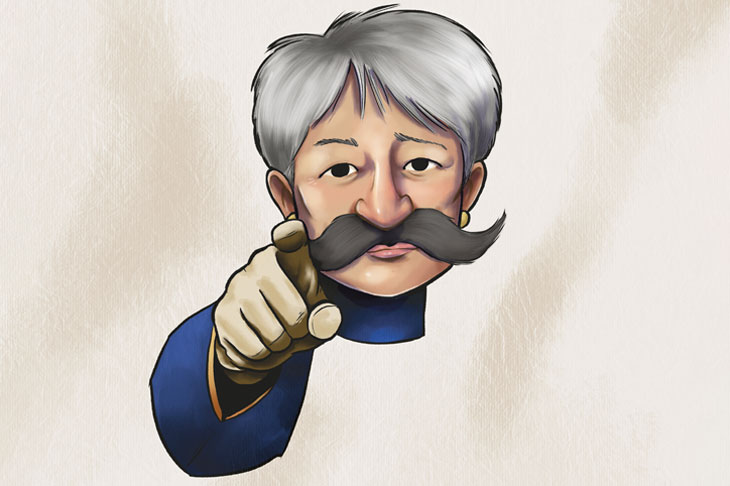As Penny Wong claims how Israel defends itself is what is critical and the Greens carp on about ‘war crimes’, many Western armed forces now want a gentler side to combat, and to create ‘nice’ soldiers. We must ‘kill and show compassion at the same time,’ says one British general. A military commentator wants the bayonet outlawed. There are calls for aggressive veterans to be weeded out.
This is a new-fangled idea. The armed forces before the flower-power revolution of the 1960s always feted their warriors. Alexander the Great had cities named after him; the Duke of Wellington was lauded all over the English-speaking world – Mount Wellington in Hobart is named after him; Audie Murphy became a USA film star after the second world war. It is only now that a new concept of warriors nicely waging war has arisen: the aggressive warrior must not be celebrated in peacetime.
Warfare is an enormously complex and difficult part of human societies. Today in many countries there is an effort to engage in it ethically. But this is fraught with problems. Knowing the scenarios, how would you answer the questions in bold below?
Experienced soldiers of the past realised that new recruits must be urged to be lethal, for good reason. Were Australian forces using this handbook wrong? A pocket book for troops, published in 1941 for the Australian Army, urged, ‘Shoot to kill. If you do not, tomorrow morning, some of those men will sit behind fresh machine-guns. Their bullets will flay your flanks, kill good soldiers, perhaps kill you…. He who lets an enemy escape may be the means of the death of his best friend.’
Sixty years after the war, Australia’s Nancy Wake, who was parachuted into France to work with the Resistance, was still accepting the need to be savage. She was made a Companion of the Order of Australia, and commented when asked by the media about her wartime experiences, ‘I killed a lot of Germans, and I am only sorry I didn’t kill more.’ Would you condemn Nancy for this?
Was US Navy Admiral William F. Halsey wrong? He exhibited the enthusiasm he wanted his people to share in his characteristically blunt way to any personnel landing at Tulagi in the Solomon Islands. A large sign proclaimed: ‘Kill Japs. Kill Japs. Kill more Japs. You will help to kill the yellow bastards if you do your job well.’
There is considerable hypocrisy in criticising such attitudes. You go to war to win, not to lose. Societies with their backs to the wall want people like Bomber Harris to come to the fore, and so he commanded the 1,000 bomber raids that levelled much of Germany in World War II. Decades later the same society says it is fine to allow people to pour paint over his statue in London.
Societies must realise, as General Sherman said, that, ‘War is cruelty and you cannot refine it.’ It is ridiculous to want attack dogs to guard you and then when they’re sent forward ask that they ‘be nice’.
Taking prisoners is not an end in itself and can be very dangerous. Modern commentators usually argue prisoners must be given every opportunity to surrender. But injured Japanese in World War II were approached with extreme caution, because previous bitter experience taught Allied soldiers they would fight to the last, often with a grenade hidden inside a loincloth. So they routinely shot fallen Japanese to ensure they weren’t still dangerous.
It’s not always possible in warfare to take prisoners or treat them humanely. In the second world war Australian soldier Richard Weston was with three British tanks herding a large group of Afrika Korps prisoners to the rear. They were delayed, and the Germans took the opportunity to run. Within seconds all three tanks opened fire with their machine-guns and kept shooting till none was left standing. Is this a war crime?
Should we investigate, and take away the Victoria Cross of Australia’s Albert Jacka? In the Western Front Jacka stormed a trench with four enemy in it who were firing at him, inflicting several wounds. He kept going, however, and eventually the Germans ‘…flung down their rifles and put up their hands’. However, he shot three and bayoneted the fourth, explaining, ‘I had to do it – they would have killed me the moment I turned my back.’ Would you remove Jacka’s VC?
In a similar circumstance during the Falklands war, Lieutenant Mark Cox was leading a small platoon of men forward against the Argentines, and took fire from them, sustaining several dead and wounded. The British threw grenades into the Argentine position and then charged in to find three wounded enemy. Private Kevin Connery took the initiative and shouted, ‘We can’t leave live enemy in front of us,’ and then despatched all three with a burst of automatic fire.
It is the reality of forward combat: to escort three prisoners to the rear would weaken your own force by 50 per cent, and expose all going to the rear to possible attack anyway. Would you condemn these soldiers for war crimes?
In New Guinea Australian soldier VX66349 noted his distress when, ‘a patrol of ours found one of our mates, who had been missing. He’d been tied to a tree by the Japs, with a length of bamboo forced into his backside’. The soldier died a little while later, and VX66349 concluded, ‘I went a little insane for a while, and when we’d cornered some Japs later on, the things we did to them now seem horrifying – but I guess that’s war.’ Should we now find this soldier and prosecute him?
What if you have only seconds to decide whether a person is a civilian or the eneny? Civilians are often not civilians. Context is everything. From the Vietnam war, perhaps one of the most famous pictures is of a South Vietnamese soldier in a street shooting a man wearing civilian clothing. It has been played thousands of times: the message was loud and clear – this is the kind of atrocity that the South Vietnamese army did to their own people, with the backing of the US.
However, the Western media did not usually report that Nguyen Ngoc Loan was executing the leader of a team of Vietcong terrorists who had killed the family of a fellow officer including his 80-year-old mother, his wife and his children. Was Nguyen Ngoc Loan wrong?
If a civilian picks up a weapon he instantly becomes a combatant. War crime or reality? Marine John Daube recalled, ‘One day a Vietnamese boy about eight years old approached our group wearing a knapsack. It looked like the bookbags kids use today. It was in the middle of the summer, so we were pretty certain there was no school. A reflection of the sun highlighted a wire that ran over the kid’s shoulder and down his arm. One of the Marines shot him. As the child fell, he pulled the wire and blew himself up.’
These are some of the dilemmas of warfare. Those who seek to condemn military forces for their actions would do well to reflect on their complexity before they begin.
Got something to add? Join the discussion and comment below.
Get 10 issues for just $10
Subscribe to The Spectator Australia today for the next 10 magazine issues, plus full online access, for just $10.
Dr Tom Lewis OAM is a military historian. In his service career with the ADF, he led a US Intelligence team in Baghdad in 2006 in some of most bitter fighting of that war. His book ‘The Truth of War’ is released by Big Sky Publishing in November 2023.
You might disagree with half of it, but you’ll enjoy reading all of it. Try your first month for free, then just $2 a week for the remainder of your first year.














Comments
Don't miss out
Join the conversation with other Spectator Australia readers. Subscribe to leave a comment.
SUBSCRIBEAlready a subscriber? Log in